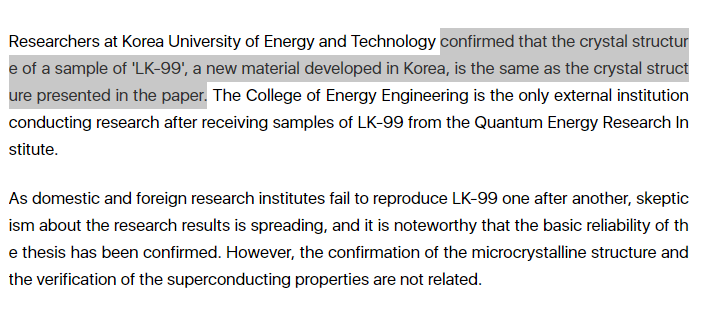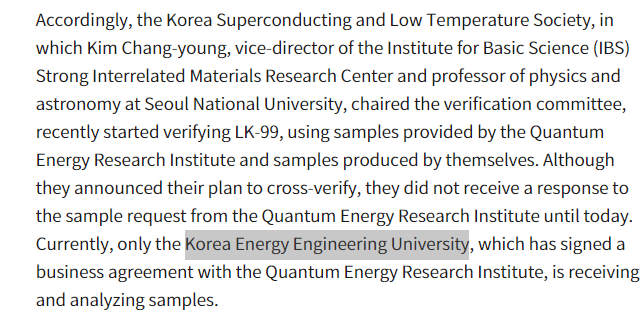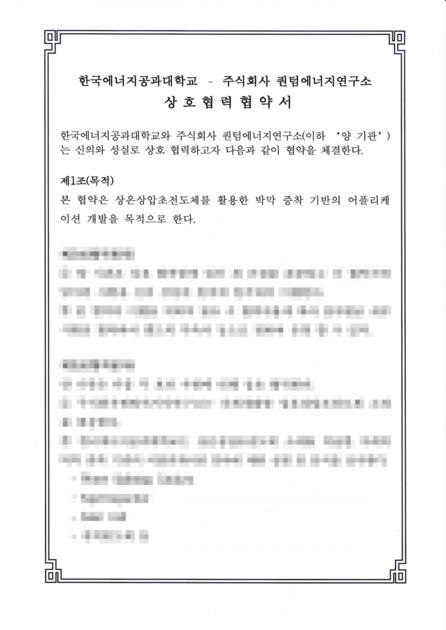A professional lab with PhDs and real scientists working at it will report they received a package containing alleged superconducting material from any the LK-99 researchers or Quantum Energy Research Center.
The report can be a press release, twitter post, blog post, etc. but should be verifiable as being from a real lab.
Before midnight Friday, August 4 PST
🏅 Top traders
| # | Trader | Total profit |
|---|---|---|
| 1 | Ṁ1,176 | |
| 2 | Ṁ899 | |
| 3 | Ṁ295 | |
| 4 | Ṁ165 | |
| 5 | Ṁ122 |
People are also trading
resolving yes unless there are arguments otherwise. The kentech link seals it. https://gs.kentech.ac.kr/news/view/250
@StrayClimb Can you elaborate on why you believe this shouldn't resolve YES yet? We have confirmation from Kentech itself now.
In English, from Kentech's official site:

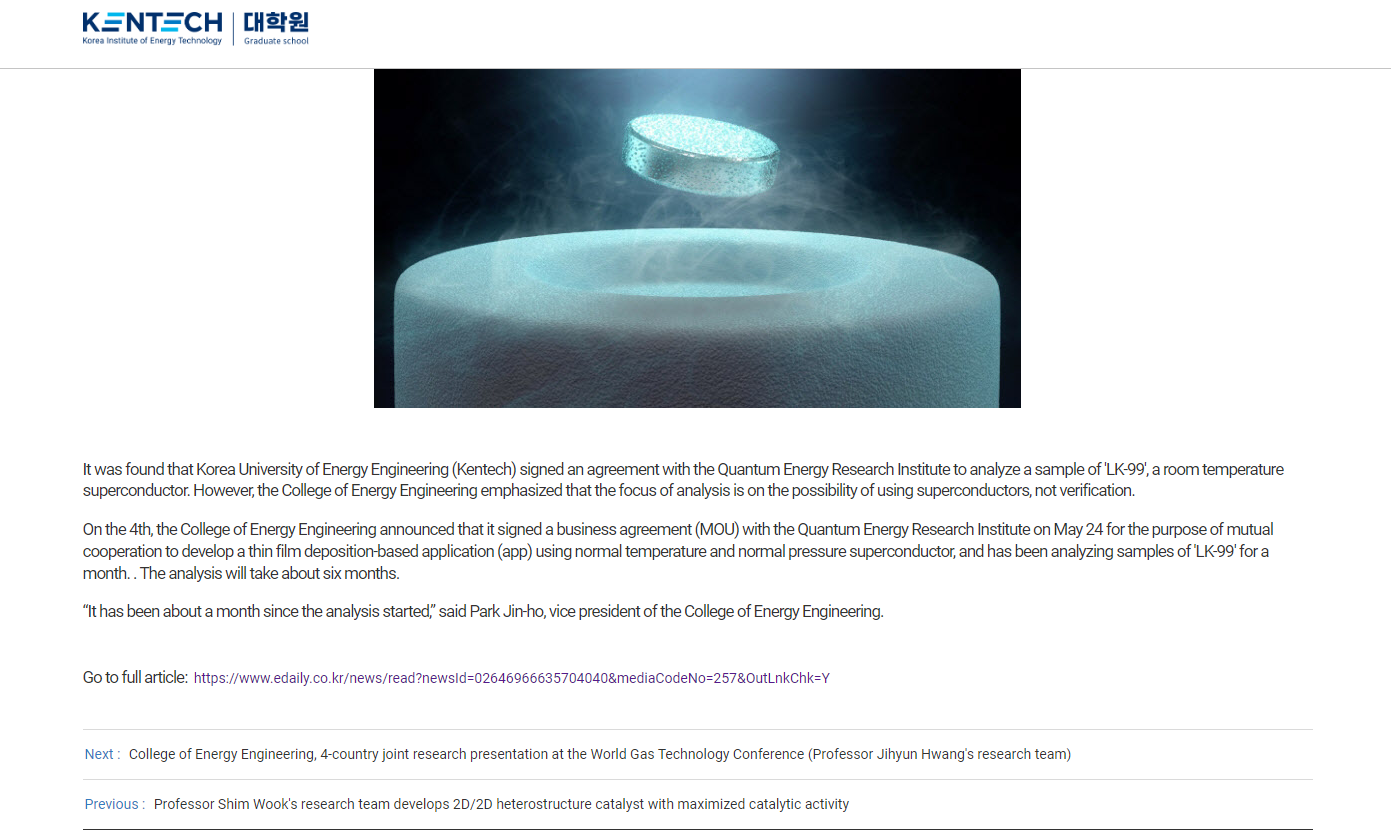
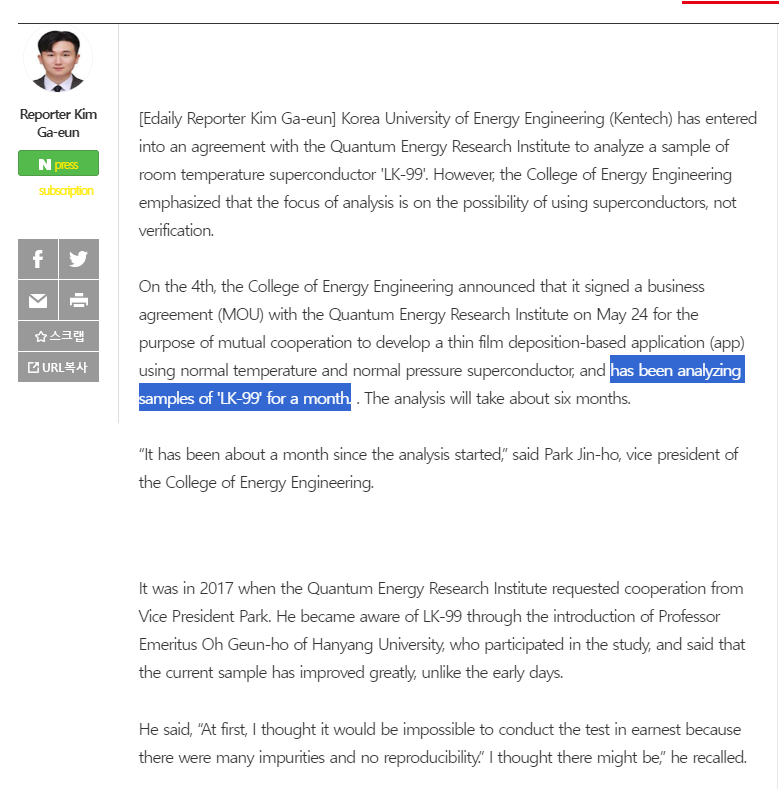
I feel dumb for not having noticed this weeks ago hahaha. Thanks for linking it.
@Joshua The article was pretty hidden in their website haha, I only found it by googling LK-99 while restricting answers to Kentech's domain.
@StrayClimb Here is another Korean article, published in the 4th of August, with quotes from Kentech claiming they have received LK-99 samples from the researchers: https://www.edaily.co.kr/news/read?newsId=02646966635704040&mediaCodeNo=257&OutLnkChk=Y
This one is different from the others because Kentech's own website also has the same quote and links to the full article, which is enough to verify it as actually coming from the lab in my opinion: https://gs.kentech.ac.kr/news/view/250
@kcs that article is dated 8/16. Is there possibly earlier information? I interpret the 8/5 in this market to be a limitation, that the sample has to have been received and reported, or at least received, before 8/5
@StrayClimb While the article on Kentech's website is dated 8/16, the article they link to in their post (https://www.edaily.co.kr/news/read?newsId=02646966635704040&mediaCodeNo=257&OutLnkChk=Y) is dated 8/4, and both contain a quote saying that analysis had already started at least a month earlier.
@MarcusAbramovitch there is a Korean language report claiming a lab there received a sample, but no further news. How do you evaluate the claims in other comments here and the other similar market covering all of August?
@StrayClimb In my view, the available reports should be sufficient to satisfy the resolution criteria (i.e. a verifiably real lab reported that they received the sample according to a blog post). I don't know of any evidence that the sample sent could be fake, either, especially since they confirmed the crystalline structure of the material matched the one in the paper. If the blog post were fake, on the other hand (of which there is no evidence), it is likely that the lab would have come out to refute it, especially given the attention it had had on internacional news.
@kcs do you have anything from the lab itself? Is this a real journalist or publication? It seems incredibly thin. Not much more than a blog post. Unless you have better links?
@StrayClimb The published article itself has first-hand information and quotes directly from members of the lab. The only other possibility would be for it to just be outright lying, but there is absolutely no evidence of that. There is, on the other hand, evidence that it is credible:
1) It has been confirmed that the lab mentioned in the article is in fact a real lab, which has an associated website with the korean equivalent of a .edu domain and publications at major journals.
2) There are at least two independent korean sources on this, both containing direct quotes from the lab saying they recieved a sample. It is unlikely that they'd both turn out to be lying. At least one of them is a major korean news network, according to another commenter in this market.
3) There are many reputable western websites that directly quote the korean articles. It is unlikely they'd do so if there were blatant credibility issues.
4) There has been extensive media coverage worldwide of these articles. If they were lying, it is likely that Kentech would have come out to say so.
5) Not having much more first-hand information from Kentech itself is consistent with they having signed an agreement with the original researchers that limits their possibility to do so.
6) The lab didn't claim the sample was superconductive (nor that it isn't), which doesn't contradict the recent findings that it is very likely not superconductive.
@MarcusAbramovitch based on this article, the claim for this happening in august seems strong. https://gs.kentech.ac.kr/news/view/250
The article denies they're testing it for superconductivity, but says they're evaluating LK-99 material and have been for about a month. And the material is LK-99, alleged superconducting stuff, from QERC
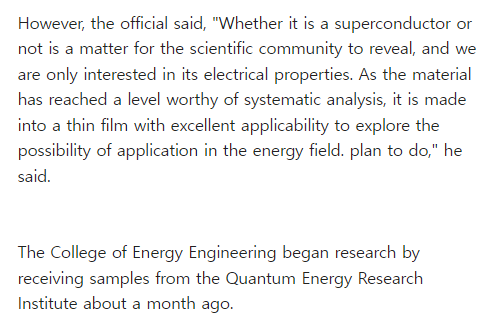
https://m.dt.co.kr/contents.html?article_no=2023080802109931650002
Another article going into more detail about how Kentech is
analyzing samples sent to them by Q-Centre.
@Joshua Interesting, thank you.
How does everyone feel? This article says that samples were previously given to the Korea Energy Engineering University
I would feel a lot safer waiting until there is a complete investigation. I feel like it could easily be revealed that the samples allegedly sent were actually something else, or that it was all a miscommunication.
https://twitter.com/gimjiun79102152/status/1687306506965037056?s=20
(See also tweet below)
Stated requirements
"professional lab with phds and real scientists"✅
"report they received a package containing alleged superconducting material"✅
from LK-99 researchers✅
press release, twitter post, blog post, otherwise verifiable ✅
Sorry, I'm not really sure why this is not already resolved? @StrayClimb Do you mind clarifying?
@JeremyHon what's the best report of this? I don't read korean. Ideal case would be a major English language newspaper, or the economist, verifying this. I won't insist on such a high bar, but since it's in korean and I'm not familiar with the linked source, I don't feel it's definite enough to judge YES yet.
I'll add some more info but if the bar is a reputable english publication we may have to wait a while.
This news report https://m.yna.co.kr/view/AKR20230804056500017 comes from
YNA or Yonhap News Agency, which is a major Korean news agency (Wiki: https://en.wikipedia.org/wiki/Yonhap_News_Agency).
This is the same article fed into google translate: https://m-yna-co-kr.translate.goog/view/AKR20230804056500017?_x_tr_sl=auto&_x_tr_tl=en&_x_tr_hl=en-US&_x_tr_pto=wapp
The translated article more or less reads the same as what others have reported - Korea Institute of Energy Technology (KENTECH) have a sample on hand and are currently analyzing it.
The reporter Seunghan Cho is a reporter with YNA and has an email under their domain: https://m.yna.co.kr/reporter/index?id=36343739393737&site=article_writer; shjo@yna.co.kr
The institute itself is a university specialized in energy research, so it's only tangentially related to superconductors. My guess is that the authors approached this institute purely for analysis help, as they have specialized equipment.
This is the website of the institute itself https://www.kentech.ac.kr/main.do
Nature's page on the institute, showing it has a few papers published - https://www.nature.com/nature-index/institution-outputs/south-korea/korea-institute-of-energy-technology-kentech/62aac261b0d572316a778287
I think outside of some kind of incredible miscommunication between the reporter and the institute, or the institute is misrepresenting (e.g. we don't actually have the sample yet), this is likely to match your resolution criteria? Let me know what else you'd like to see.
@JeremyHon Thanks so much for assembling all this information. How does everyone else feel? Are there any doubters?
@StrayClimb Is there any concern arising from the agreement KENTECH have signed with QERC to work as a collaborator/business partner in research and development, before the arxiv publications? Therefore potentially not qualifying themselves as independent from "the LK-99 researchers". From the translation:
"...has signed an agreement with the Korea Institute of Energy Engineering for research using this material.
According to the Quantum Energy Research Center and the College of Energy Engineering on the 4th, the two institutions signed a memorandum of understanding (MOU) on May 24 to cooperate with each other for the development of thin film deposition-based applications using room temperature and normal pressure superconductors." [the translation also states "last May", so unclear if that would be May 2022]
If it's just a matter of being a lab and having a sample then surely Hyuntak Kim and other non-QERC researchers from the second arxiv paper would already fulfil the requirements.
@MattTaylord664 the people in the second arxiv paper are 'the LK-99 researchers' referenced in the market description
@Odoacre Yes, that's my point. My question is would KENTECH also qualify as "the LK-99 researchers" or otherwise be disqualified since they have been working on the thin film depositions even though those aren't in the original paper(s).
Presumably any lab such as MIT would also need to sign some kind of agreement in order to receive a sample and that would not disqualify them. The KENTECH people have only recently come into the scene and were not part of the original group that has been researching LK-99 for for 20+ years. KENTECH received the sample last May 2023 (they said they've had if for about a month)
@MattTaylord664 I think that goes against the spirit of the question. My interpretation of the question is simply "will the LK-99 researchers" send a sample to another lab.
Your argument is essentially that the other lab is also part of the "LK-99 researchers", and are not independent due to signing an MOU.
But KENTECH and HT Kim or any of the known authors have so far not spoken out together. They have never represented themselves as one group. The burden of proof should be on you to show us that they are not independent, not on us to show you that they are.
@JeremyHon I agree that with the wording on this question the argument that KENTECH are part of "the LK-99 researchers" seems a little weak. However, I feel if KENTECH having received a sample previously resolves it as YES then that is what goes against the spirit of the question, since KENTECH have 0 expertise in superconductors and IMHO are unlikely to do any of their own validation of the superconductivity (saying "6 months" seems just about them waiting for the dust to settle so they aren't embarrassed if it turns out not to be real). It sounds like they were brought in to work on applications of the material and because they have an electron microscope. (Ironically the additional authors on the second arxiv paper look the closest to independent validation so far, but they don't count because they are already involved, which was kind of my point.)
But rather than try to argue this question into being the one I want to see (whether a external independent lab will get a sample to verify the superconductivity), I have created my own.
@MattTaylord664 Hmm, I see your point, but there's nothing in the wording of the question about the purpose of why another lab received a sample. Whether it's for analysis on behalf of the LK-99 researchers or it's another independent entity for verification, either would fulfill the wording of "another lab received a sample".
@JeremyHon Agree. Hence for this question it comes down to who qualifies as "the LK-99 researchers".
I don't have a stake in this question currently (and haven't while I've been asking this), I'm interested in if the LK-99 authors will send a sample to some external lab to test their claims of superconductivity, rather than for a some other more trivial reason, hence why I created a more specific question.
@Joshua If Q-Centre are "the LK-99 researchers" then surely the sample(s) investigated by Hyun-Tak Kim from College of William & Mary (author on the better arxiv paper) would also count... which kind of makes this question a bit irrelevant but might still resolve it as yes.
By the letter of the market, I think this market can only resolve on reports that are published after market creation but before 8/5. It's the timing of the report which resolves the market, not the timing of the sample being received.
Like hypothetically if MIT had revealed on 8/4 that Q-Centre sent them some LK-99 two months ago that would definitely satisfy the resolution criteria. I don't see KENTECH as being much different from MIT. Q-Centre developed LK-99 themselves, and then provided samples of the LK-99 that they researched to KENTECH, who then began to double check their work. KENTECH are definitely not the researchers that the description refers to, because their involvement was unknown when the description was written.
I see why the market creator wants to be sure that they definitely did receive the samples, though I'm sad to see my mana locked in here for an indefinite period of time. I feel like the announcement I posted above is sufficient secondary confirmation of the original report from a few days ago.
@Joshua It seems KENTECH signed a business arrangement with Q-Centre to develop applications of the material rather than check their work (they have no expertise in superconductors), so definitely not the equivalent of MIT. [It probably still makes the question resolve yes, but probably not in the way the question was intended. We shouldn't be fooled into thinking this is Q-Centre getting someone to verify the superconductivity. I have created a couple of questions more specifically about that.]
